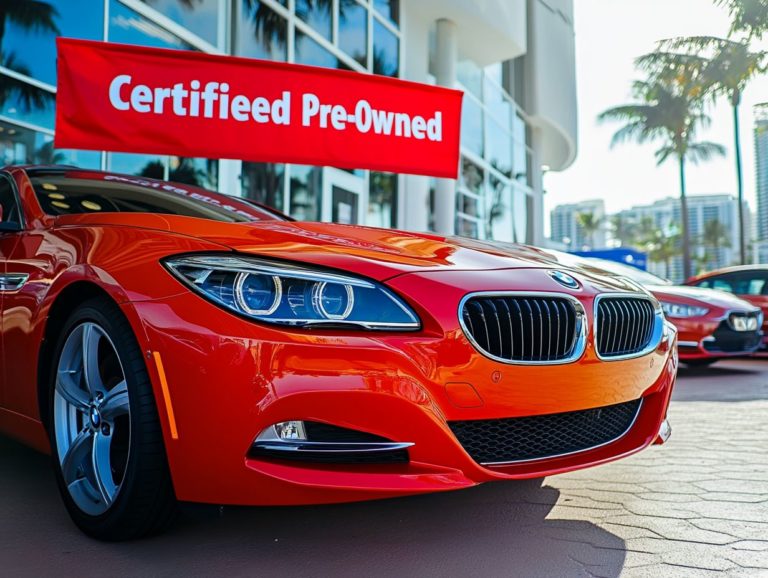5 Tips for Finding the Best Lease Deals
Leasing a car can be a smart financial choice, but the process often feels overwhelming. Whether you re leasing for the first time or looking to improve your negotiation skills, it’s essential to understand the details of leasing.
Get ready to discover five essential tips that will help you snag the best lease deals! We will also explore the benefits and drawbacks of leasing versus buying, so you can make an informed choice for your next vehicle.
Prepare to uncover valuable insights that will enhance your leasing experience!
Contents
- Key Takeaways:
- 1. Research, Research, Research
- 2. Know Your Budget and Stick to It
- 3. Consider the Length of the Lease
- 4. Negotiate for Additional Perks
- 5. Read and Understand the Fine Print
- What Are the Benefits of Leasing a Car?
- Frequently Asked Questions
- What are the 5 tips for finding the best lease deals?
- Is it important to research different dealerships when looking for lease deals?
- How do I compare lease offers?
- Can I negotiate the monthly payment for a lease?
- Why is it important to understand the terms and conditions of a lease?
- Are there any leasing incentives that I should consider?
Key Takeaways:

- Do your research before committing to a lease deal. Look for options, compare prices and terms, and read reviews.
- Know your budget and stick to it. Consider your monthly payment, fees, and expenses. Don t overspend for a fancier car.
- Think about the lease length. Longer leases may have lower payments, but you could pay more over time. Choose a term that suits your needs and budget.
1. Research, Research, Research
Before you dive into leasing, doing your homework is crucial. Understand the leasing options available and how they fit your budget, driving habits, and vehicle preferences.
This preparation will help you make informed choices when selecting the best deal from reputable dealers, saving you time and money. Compare monthly payments across different models to find the best value.
Be sure to examine leasing contracts closely to uncover any hidden fees or mileage limits. Familiarize yourself with vehicle options you like, so you can discuss them confidently with sales representatives.
Using reliable resources like Kelley Blue Book and Bankrate can give you clarity and bargaining power. With this knowledge, you can negotiate effectively for favorable leasing terms.
2. Know Your Budget and Stick to It
A clear budget is essential when considering car leasing. This budget will guide your monthly payments, down payment, and overall leasing costs.
Remember to factor in all potential expenses, including insurance premiums and maintenance costs. Keep an eye on mileage restrictions that could lead to extra charges.
These costs can greatly impact your overall affordability. By monitoring your spending, you’ll maintain financial stability and avoid unexpected expenses.
Stick to your budget throughout the leasing process for a worry-free experience. Enjoy your vehicle without the stress of overspending!
3. Consider the Length of the Lease
The length of your lease affects your monthly payments, mileage allowance, and the vehicle’s value at the end of the term. Be mindful of these factors to avoid penalties and ensure satisfaction with your leasing agreement.
Understanding the differences between short-term and long-term leases is key. Short-term leases offer lower monthly payments and the chance to drive a new model every few years, but they often come with stricter mileage limits.
Long-term leases might provide more mileage flexibility, but they can tie you to a vehicle that may not suit your future needs. Assessing your driving habits and plans will help you choose a lease that fits your lifestyle.
4. Negotiate for Additional Perks

Negotiating for additional perks in your leasing contract can significantly elevate your leasing experience. By securing better incentives, lease buyout options, and provisions for excess wear, you can add substantial value and peace of mind throughout the lease term.
When you approach dealers with a solid grasp of these factors, you position yourself to advocate for beneficial additions like gap insurance, which covers the difference between what you owe and the car’s worth if it’s stolen or totaled. Discussing maintenance packages can lead to lower long-term costs, as regular servicing and repairs are covered. A dealer may even be inclined to waive certain fees or provide complimentary service visits, ultimately reducing your overall expenses.
By employing these negotiation strategies, you can craft a leasing agreement that aligns perfectly with your needs and budget, ensuring a smoother and more satisfying leasing journey.
5. Read and Understand the Fine Print
Reading and thoroughly understanding the fine print of your leasing contract is absolutely critical. This document holds essential details about fees, penalties, insurance policies, and conditions that could significantly impact your experience and financial obligations over time.
A careful examination of this contract can unveil hidden fees or unfavorable terms that may not be immediately obvious. For instance, pay close attention to mileage restrictions; exceeding them could lead to hefty overage charges. Maintenance responsibilities also vary some contracts expect you to handle routine upkeep, while others offer a more comprehensive maintenance plan.
Grasping these nuances can help you avoid unexpected costs, ensuring a smooth and financially sound leasing journey. Investing time to analyze these details during the leasing process isn t just a wise move; it can save you from potential frustration and expenses in the future.
What Are the Benefits of Leasing a Car?
Leasing a car presents a multitude of advantages that may catch your eye. You ll enjoy lower monthly payments compared to purchasing, along with the thrill of driving a new vehicle every few years! Imagine enjoying all the latest features without the stress of ownership.
Plus, you can set aside concerns about depreciation and maintenance costs, making leasing an enticing option for those who wish to relish the latest features without a hefty financial burden.
Beyond these immediate perks, leasing can also unlock potential tax benefits that aren t always available to those who opt for outright purchases. If you re a business owner, you might find your lease payments to be tax-deductible, adding another layer of appeal to this arrangement.
Many leases even offer options for gap insurance, safeguarding you in the event of theft or an accident, so you won t find yourself in a precarious financial position. When stacked against buying, leasing typically demands significantly lower upfront costs, which is particularly attractive for anyone keen on maintaining financial flexibility.
What Are the Different Types of Lease Deals?
You’ll discover a variety of lease deals available to you, including:
- Closed-end leases
- Open-end leases
- Special leasing programs from dealers
Understanding these options can significantly influence how you manage your budget and navigate your driving habits. Closed-end leases typically come with fixed terms, allowing you to return the vehicle at the end of the lease without worrying about its residual value. This arrangement is ideal for those who appreciate predictable payments.
Conversely, open-end leases may suit businesses or individuals who tend to drive more miles. They offer flexibility, but keep in mind that this flexibility might lead to extra costs if the vehicle s value depreciates beyond a certain threshold.
By researching various offers from dealerships and considering factors such as mileage limits, maintenance packages, and end-of-lease fees, you ll be well-equipped to compare these deals effectively. This approach ensures that you make an informed decision that aligns seamlessly with your financial situation and driving needs.
Ready to find your ideal lease? Start exploring your options today!
What Are the Common Mistakes to Avoid When Leasing a Car?

When you’re leasing a car, it’s easy to fall into common traps, like overlooking mileage restrictions, neglecting to negotiate terms, and not fully grasping the leasing contracts. These mistakes can result in surprise fees that increase your overall costs.
Ignoring the fine print can leave you blindsided by potential fees for wear and tear, as well as those hidden end-of-lease costs that can pop up out of nowhere. Many drivers also underestimate maintenance expenses, mistakenly believing that routine servicing is covered when it often isn’t. Another frequent misstep is failing to thoroughly research and compare leasing options from different dealerships.
To improve your leasing experience, carefully review the lease agreement and clarify all terms with the dealer. Factor in potential maintenance and mileage charges from the get-go. Keeping these considerations in mind can help you steer clear of unpleasant surprises later on.
How Can One Get the Best Lease Deals?
To get the best lease deals, commit to thorough research and strategic negotiation during the leasing phase. For tips on securing the best offers, check out how to find the best car deals online. This approach maximizes value while minimizing both monthly payments and overall costs.
Begin by obtaining competitive price quotes from various dealers. Don t just focus on the monthly payments be sure to compare the terms and conditions attached as well. Diligent negotiation is key; dealers are often open to adjusting their offers, especially when you present them with competing quotes.
Timing is crucial. Consider leasing during promotional periods when manufacturers frequently offer special incentives or rebates, increasing your chances of snagging a favorable deal. By approaching multiple dealerships and negotiating assertively, you significantly enhance your likelihood of securing a lease that aligns perfectly with your financial strategy.
What Are the Pros and Cons of Leasing vs. Buying a Car?
When deciding between leasing or buying a car, weigh the pros and cons carefully. Leasing often means lower monthly payments and less upfront cost, while buying provides you with ownership and typically results in fewer long-term expenses linked to depreciation and maintenance.
Your decision depends on your individual circumstances and priorities. Leasing allows you to drive a newer model with the latest features every few years, which is quite appealing if you value having cutting-edge technology and vehicles at your fingertips.
On the other hand, purchasing a car can be more financially savvy in the long run, especially if you plan to keep the vehicle for an extended period. Ownership eliminates those ongoing payments and can build greater equity over time.
Lifestyle factors, such as your mileage needs and preferences for vehicle customization, further complicate the choice. It’s crucial to consider both the financial impacts and your personal desires to ensure your decision aligns with your broader lifestyle and financial goals.
What Are Some Tips for Negotiating a Lease Deal?
To negotiate a lease deal effectively, you need preparation and a clear understanding of your goals. This way, you can secure favorable terms and a monthly lease payment that aligns with your financial situation.
Thoroughly researching the market value of the vehicle you re interested in is crucial, as this knowledge lays a strong foundation for discussions. It s also essential to dive into the cost breakdown in leasing contracts, paying attention to factors like residual value and money factor, which significantly influence your monthly payments.
Practicing negotiation techniques like role-playing scenarios with a friend or exploring various outcomes can boost your confidence and refine your strategies. This preparation allows you to articulate your needs clearly and assertively during the actual negotiation process.
Frequently Asked Questions

What are the 5 tips for finding the best lease deals?
Here are five tips for finding the best lease deals. First, research different dealerships to see varied offers and consider the essential tips for first-time car leasees to help guide your decision.
Second, compare lease offers to find the most affordable option. Third, negotiate the monthly payment. Fourth, understand the terms and conditions of the lease. Finally, for a seamless process, check out 5 tips for a smooth new car purchase experience and consider any special offers for leasing.
Is it important to research different dealerships when looking for lease deals?
Yes, researching different dealerships is essential. Each dealership may have unique offers and incentives.
This comparison helps you choose the best deal for your needs.
How do I compare lease offers?
To compare lease offers, look at the total lease cost, including the monthly payment, down payment, and any fees.
Also, consider the lease length, mileage restrictions, and additional features included.
Can I negotiate the monthly payment for a lease?
Absolutely! You can negotiate the monthly payment by seeking a lower interest rate, extending the lease term, or lowering the down payment.
Why is it important to understand the terms and conditions of a lease?
Understanding lease terms is crucial! It directly affects what you pay each month and keeps you in control.
Pay attention to mileage restrictions, wear and tear guidelines, and any associated fees.
Are there any leasing incentives that I should consider?
Yes, dealerships often provide special offers such as cash back, reduced interest rates, or waived fees.
These offers can help you save money on your lease, making it vital to consider how to find the best car deals in your area when searching for the best lease deals.
Ready to find your ideal lease? Start exploring your options today!






